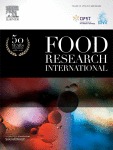Product involvement and consumer food-elicited emotional associations: Insights from emoji questionnaires
Dublin Core
Título
Tema
Abstract
Fuente
Editor
Fecha
Derechos
Información sobre Derechos de Autor
(Por favor lea este aviso antes de abrir los documentos u objetos)
La legislación uruguaya protege el derecho de autor sobre toda creación literaria, científica o artística, tanto en lo que tiene que ver con sus derechos morales, como en lo referente a los derechos patrimoniales con sujeción a lo establecido por el derecho común y las siguientes leyes (LEY 9.739 DE 17 DE DICIEMBRE DE 1937 SOBRE PROPIEDAD LITERARIA Y ARTISTICA CON LAS MODIFICACIONES INTRODUCIDAS POR LA LEY DE DERECHO DE AUTOR Y DERECHOS CONEXOS No. 17.616 DE 10 DE ENERO DE 2003, LEY 17.805 DE 26 DE AGOSTO DE 2004, LEY 18.046 DE 24 DE OCTUBRE DE 2006)
ADVERTENCIA - La consulta de este documento queda condicionada a la aceptación de las siguientes condiciones de uso: Este documento es únicamente para usos privados enmarcados en actividades de investigación y docencia. No se autoriza su reproducción con fines de lucro. Esta reserva de derechos afecta tanto los datos del documento como a sus contenidos. En la utilización o cita de partes debe indicarse el nombre de la persona autora.
Formato
Idioma
Tipo
Identificador
Document Item Type Metadata
Original Format
- Fecha de agregación
- August 10, 2018
- Colección
- Bibliografía Nacional Química
- Tipo de Elemento
- Document
- Etiquetas
- CATA, Comportamiento del consumidor, Emoticones, Medición de la emoción, Métodos de búsqueda
- Citación
- Jaeger, Sara R, “Product involvement and consumer food-elicited emotional associations: Insights from emoji questionnaires,” RIQUIM - Repositorio Institucional de la Facultad de Química - UdelaR, accessed July 26, 2024, https://riquim.fq.edu.uy/items/show/5053.
- Archivos

